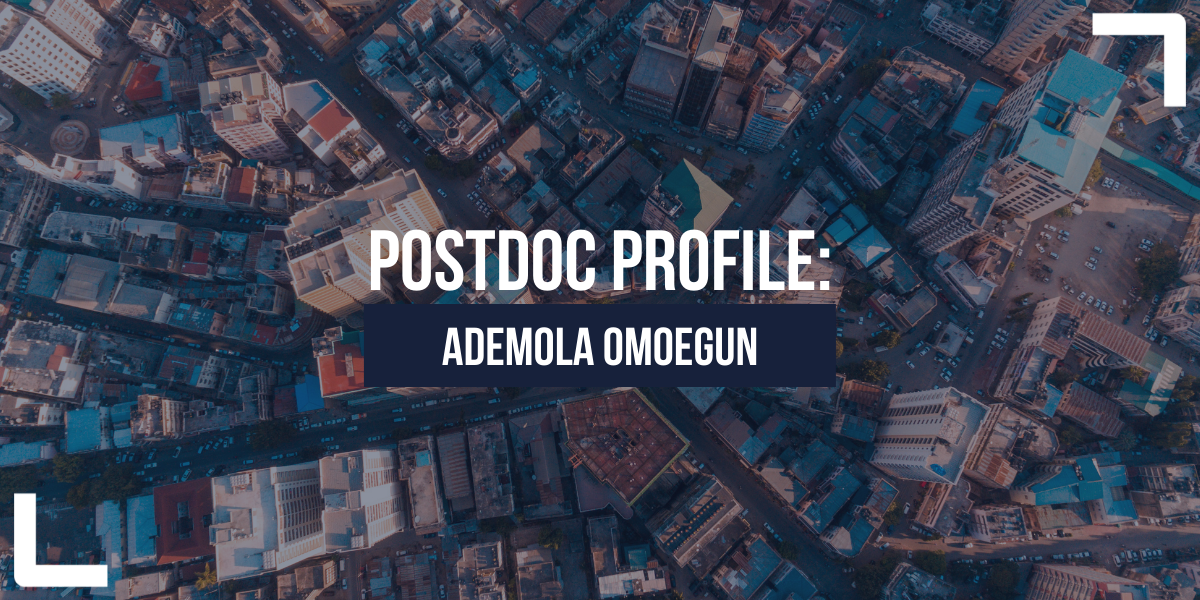Eight postdoctoral research fellows joined ACRC in early 2022, based at The University of Manchester’s Global Development Institute. As well as working on their own research, the postdocs are providing vital support across our eight urban development domains, with mentoring from dedicated members of our research team.
Here, Ademola Omoegun talks about his focus on understanding how and why most urban residents in Africa are excluded from economic opportunities, his research into urban displacement in Lagos, and the importance of local actors in driving change.

Tell us a bit about your background…
I grew up in Lagos, Nigeria, where I studied architecture at The University of Lagos. This raised my curiosity about the urban environment, motivating me to undertake a master’s degree in urban planning at The University of Manchester and subsequently a PhD in urban planning and international development at Cardiff University. I was particularly keen to study urban planning in the United Kingdom as the planning systems in Nigeria and many other African countries have British origins.
After my PhD, I returned to the University of Lagos as a lecturer and in 2018, I took a position as a postdoctoral researcher at the African Centre for Cities at the University of Cape Town. A key lesson I have learnt over the years and which I am passionate to communicate through my work is the vital importance of understanding, learning from and adapting to the realities on the ground when thinking about African cities – rather than having an overreliance on foreign perspectives.
How would you explain your research to a friend or family member?
My research fundamentally seeks to understand how and why the majority of African urban residents are largely excluded from available economic opportunities, whilst only a small section benefit. This situation can be seen in the high levels of inequality and fragmentation evident in many African cities. More specifically, my research explores the experiences of the numerous residents of informal settlements and those working in the informal economy, such as street traders, waste-pickers, small-scale tailors, hairdressers and roadside mechanical services – who are a dominant feature of many African cities – and examining their largely negative experiences and non-inclusion in urban and economic plans. My work seeks to understand the challenges they face and propose ways in which their work can be better appreciated, included and scaled up to make a valuable contribution to the local economy – whilst continuing to provide important employment and livelihood opportunities to a large share of the urban population.
What does your role within ACRC entail?
As part of ACRC, I belong to the neighbourhood and district economic development domain, where I have the opportunity to contribute to research on household microenterprises (HMEs). These are informal businesses employing the entrepreneur either alone, or together with members of their household, and for which the home often plays an important role in the enterprise’s activities. Some key objectives of the domain include examining how HMEs’ productivity and profitability can be increased, how they can become more economically viable as businesses, and how they can build resilience to climate change and environmental disaster.
I am also conducting my own research on urban displacements cutting across evictions from informal settlements and markets in Lagos, Nigeria. Specifically, I am investigating the factors that underlie such displacements and their effects on low-income residents who are often the most affected – including how they cope in the aftermath of such evictions, and how they can better organise to communicate to authorities the challenges that displacements pose to their lives and livelihoods.
“What particularly excites me about this research fellowship is the focus of ACRC to inform better decisionmaking by urban policymakers and reformers in Africa, based on an understanding of the political economy of individual cities and partnership with local actors on the ground.”
What are you finding most interesting about your work with ACRC so far? What are you most excited about?
What I have found most interesting so far is the opportunity to engage with various prominent scholars on African urban development as well as interact directly with specialists based across a variety of African cities, who provide first hand updates on happenings across diverse contexts. What particularly excites me about this research fellowship is the focus of ACRC to inform better decisionmaking by urban policymakers and reformers in Africa, based on an understanding of the political economy of individual cities and partnership with local actors on the ground. This is because political and economic factors play a major role in urban decisionmaking, especially in Africa, yet they are often inadequately considered and local actors are vital to understanding important contextual peculiarities that can hinder change. Therefore, I find this combined focus of ACRC particularly exciting.
In fewer than five words, what one issue do you think needs to be prioritised to improve urban development in African cities?
Better inclusion of disadvantaged communities.
What do you enjoy doing in your spare time?
I enjoy spending time with family and friends, listening to music and engaging in sports.
Note: This article presents the views of the author featured and does not necessarily represent the views of the African Cities Research Consortium as a whole.
The African Cities blog is licensed under Creative Commons Attribution-NonCommercial-NoDerivatives 4.0 International (CC BY-NC-ND 4.0), which means you are welcome to repost this content as long as you provide full credit and a link to this original post.


